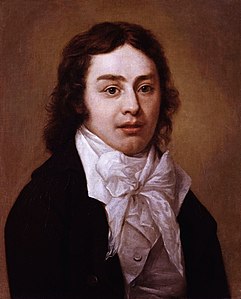To the Nightingale
Samuel Taylor Coleridge 1772 (Ottery St Mary) – 1834 (Highgate)
Sister of love-lorn Poets, Philomel!
How many Bards in city garret pent,
While at their window they with downward eye
Mark the faint lamp-beam on the kennell'd mud,
And listen to the drowsy cry of Watchmen
(Those hoarse unfeather'd Nightingales of Time!),
How many wretched Bards address thy name,
And hers, the full-orb'd Queen that shines above.
But I do hear thee, and the high bough mark,
Within whose mild moon-mellow'd foliage hid
Thou warblest sad thy pity-pleading strains.
O! I have listen'd, till my working soul,
Waked by those strains to thousand phantasies,
Absorb'd hath ceas'd to listen! Therefore oft,
I hymn thy name: and with a proud delight
Oft will I tell thee, Minstrel of the Moon!
'Most musical, most melancholy' Bird!
That all thy soft diversities of tone,
Tho' sweeter far than the delicious airs
That vibrate from a white-arm'd Lady's harp,
What time the languishment of lonely love
Melts in her eye, and heaves her breast of snow,
Are not so sweet as is the voice of her,
My Sara - best beloved of human kind!
When breathing the pure soul of tenderness,
She thrills me with the Husband's promis'd name!
Font size:
Submitted on May 13, 2011
Modified on May 02, 2023
- 1:02 min read
- 152 Views
Quick analysis:
| Scheme | ABCDEFGHIJKAKLMNOPQRHSTUVG |
|---|---|
| Closest metre | Iambic pentameter |
| Characters | 1,112 |
| Words | 198 |
| Stanzas | 1 |
| Stanza Lengths | 26 |
Translation
Find a translation for this poem in other languages:
Select another language:
- - Select -
- 简体中文 (Chinese - Simplified)
- 繁體中文 (Chinese - Traditional)
- Español (Spanish)
- Esperanto (Esperanto)
- 日本語 (Japanese)
- Português (Portuguese)
- Deutsch (German)
- العربية (Arabic)
- Français (French)
- Русский (Russian)
- ಕನ್ನಡ (Kannada)
- 한국어 (Korean)
- עברית (Hebrew)
- Gaeilge (Irish)
- Українська (Ukrainian)
- اردو (Urdu)
- Magyar (Hungarian)
- मानक हिन्दी (Hindi)
- Indonesia (Indonesian)
- Italiano (Italian)
- தமிழ் (Tamil)
- Türkçe (Turkish)
- తెలుగు (Telugu)
- ภาษาไทย (Thai)
- Tiếng Việt (Vietnamese)
- Čeština (Czech)
- Polski (Polish)
- Bahasa Indonesia (Indonesian)
- Românește (Romanian)
- Nederlands (Dutch)
- Ελληνικά (Greek)
- Latinum (Latin)
- Svenska (Swedish)
- Dansk (Danish)
- Suomi (Finnish)
- فارسی (Persian)
- ייִדיש (Yiddish)
- հայերեն (Armenian)
- Norsk (Norwegian)
- English (English)
Citation
Use the citation below to add this poem to your bibliography:
Style:MLAChicagoAPA
"To the Nightingale" Poetry.com. STANDS4 LLC, 2024. Web. 19 Apr. 2024. <https://www.poetry.com/poem/34391/to-the-nightingale>.



Discuss the poem To the Nightingale with the community...
Report Comment
We're doing our best to make sure our content is useful, accurate and safe.
If by any chance you spot an inappropriate comment while navigating through our website please use this form to let us know, and we'll take care of it shortly.
Attachment
You need to be logged in to favorite.
Log In